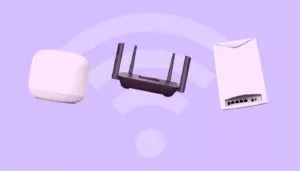
How to Choose an Internet Plan
Unlike phone plans that are rather limited in Canada, the selection of internet plans is vast. Yet, more choices mean more challenges when choosing the right one for your lifestyle. Depending on where you live, your budget and your expectation of internet speed, there are many options on the market to consider. For instance, if you are residing in Western Canada, you might have heard that Telus, Shaw, Bell or Sasktel offer affordable internet places. Those who are in the area of Quebec have a Videotron provider, while Eastlink provides internet to the Atlantic side of the county.
Of course, no matter the name of an internet provider, most people search for fast-speed internet for streaming TV and movies, online gaming and working from home. For any of those reasons, reliable internet service is a must. Hence, today we are discussing factors you need to consider when choosing an internet plan for your work or home.
Why Trust Us
For this guide, we spent numerous hours researching not only the best internet providers in Canada but focusing primarily on how to choose an internet plan for your home. This guide is a helpful tool that in a brief format gives you the necessary information on what factors to consider before signing up for a contract with an internet provider.
Throughout the research, we find out what industry experts have to say about choosing an internet plan, (Whistle Out, Finder, HelloSafe and others). Besides experts’ opinions, we read personal blogs that discuss all details involved in choosing an internet plan.
What to Look For in Internet Plans
Internet Speed
“The speed you choose for your internet plan will have a significant role in your overall experience. Too much speed and you may be paying much more than you’re using; not enough speed and your family may be frustrated with slow performance,” says Whistle Out.
Someone who works from home, or studies online will need a much faster, flawless internet connection than those who only occasionally watch movies or scroll through Facebook. To match the speed internet to your lifestyle, consider Mbps (megabits per second). The higher Mbps are, the faster the internet speed will be.
(Keep in mind that even the fastest internet can be affected not only by megabits per second, but also type of usage and how many people are using it at the same time.)
Connection Types
The internet connection types are DLS, cable, fiber and satellite. Each of those types offers different speeds, prices and availability.
The highest-ranked connection type is fiber internet. It is recommended to choose fiber internet when you want the highest speed. This new technology uses optic cables to transfer data faster than any other type, providing a reliable connection. Typically, fiber internet offers 50-1000 Mbps, with an average price of $75 to $150 per month.
DSL is the second type of connection that you could consider, if for instance, fiber is not available where you live, or if a slower speed would not cause any issues. DSL uses existing telephone infrastructure; thus, it is more available than fiber connection. Yet, to compare those two types, DSL only comes at 5-45 Mbps with an average price of $25-$80 per month. This speed is more than enough for completing online assignments or browsing social media.
The cable comes somewhere in between fiber and DSL connection. This internet connection runs at 20-200 Mbps and costs around $30-$100 per month. If you do not need the fastest internet connection for work, yet DSL would not be swift enough to stream movies or use for a few family members at the same time, cable internet is the best solution for both families and students.
The last type, satellite internet, is also one of the slowest ones. 10-30 Mbps of satellite connection costs around $50-$150 per month and is typically used in rural areas where cable, fiber, and DSL internet are inaccessible.
Price
Internet connection is something you would have to pay for every month. Considering this fact alone you can count approximately how much of your monthly budget will go into internet payments. Besides paying for reliable internet, and adequate speed, there might be extra charges such as equipment feels (modem, router), installation fees, and overage fees (choose a plan with unlimited data or watch out for monthly data fees).
According to Moving Waldo, “Based on the average internet speed of 25 Mbps and a Cable connection, here is what you should be expecting to pay in the following provinces:
- Quebec $40 CAD + Tx
- Ontario $45 CAD + Tx
- British Columbia: $30 CAD + Tx
- Alberta: $30 CAD + Tx”
Consider Promotion Plans
In case you were wondering if you could combine your home internet with other perks such as a home phone, cell phone or TV, yes, there is such a possibility. Most internet providers offer deals that could be selected with their popular plans. Beware of promotions that do not offer extended contracts, for such are typically not worth it.
However, if a contract offers a bundle that helps you save on the total cost, then it might be worth considering signing. Some of the plans are,
- Internet + TV
- Internet +TV + Cell phone
- Internet + TV + Cell phone + Home Phone
- Internet + TV + Cell phone + Home Phone + Smart home
Read more in-depth about who has the cheapest internet plans available plans in Western Canada.
For instance, Teksavvy offers the cheapest internet in Canada, so they’re worth a look no matter where you live. Canada’s landscape and population are diverse, so the top Internet Service Provider (ISP) can change based on where you live and what you need from your home internet connection.
Finally, you can always check your recent internet bill to find out your monthly data usage. That is of course if you have a limited data plan. When choosing an internet plan whether with benefits or without, knowing your usage might help to see if you need to switch to unlimited data could have limited option and save more money.
Common questions and answers
How to choose an internet plan?
Of course, you can always sign up for a random internet plan, but thorough research of available plans can provide you with the best prices and speed. Consider the following factors when choosing an internet plan for your home.
The type of internet connection is the first one to keep in mind, (DSL, fiber, and cable), speed (where a good download speed is at least 100 Mbps), duration of the plan, required installation and finally, price.
What is the best home internet plan in Canada?
Depends on where you live in Canada, to name a few main internet providers would be Bell, Telus, SaskTel, Videotron and Eastlink. But to name only one internet provider who offers the best match of price and speed would be Telus. As per Statista, “Between June 2021 and June 2022, Telus provided the fastest internet connection in Canada with an index speed of 281.1 Mbps.”
Yet, if you are not so concerned about the fastest speed, and would rather prefer to choose the most affordable price, consider Bell (their cheapest plan is $49.95 per month).
How to see what internet plan I have?
No matter who is your internet provider, you would have to create an account either through a designated app or a web page. Hence, to see the internet plan you have, data usage, prices and monthly bills you would have to login into your account and click on the ‘My Services’ tab. Then click to view your download and upload speeds.
Can I cancel my internet contract?
It depends on your internet provider. Some companies lock you in for a defined period of time. Meanwhile others simply expect month-to-month payment without any contract. Before signing a contract consider whether you are just testing out a new provider or planning to stay with this provider for a while. In case if you have a contract internet plan and want to cancel it immediately, there might be a cancellation fee. That being said, if you want flexibility, choose no contract internet provider.
Read more

WiFi Booster: The Best Wi-Fi Extenders in Canada
WiFi boosters can expand your wireless coverage, but are they worth it?

The Best Powerline Adaptors in Canada
No more dead zones! Boost your internet connection with these Powerline Adaptors

The Best Wireless Routers in Canada
Great internet connection requires an amazing Wi-Fi router. Find the perfect one here.

The Best Internet Providers in Canada
If you’re looking for a new internet provider, look no further.